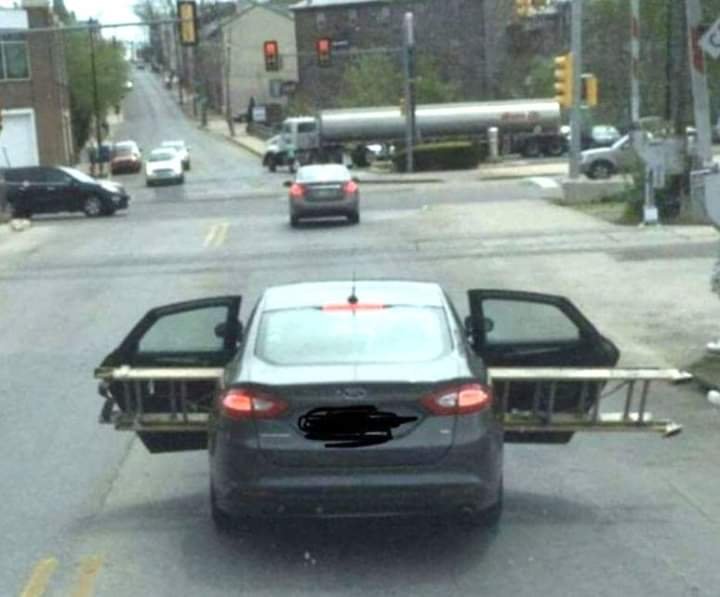-
Posts
4,004 -
Joined
-
Last visited
Content Type
Profiles
Forums
Articles
News for Home Inspectors
Events
Blogs
Gallery
Store
Downloads
Posts posted by Bill Kibbel
-
-
I'm a bit limited on the max ladder length my car can carry.

-
 2
2
-
 1
1
-
-
I don't know of any requirement - if the closet is contained within the garage and is not considered an opening into the residence.
-
That's a nice shot. I like water towers.
Here's Neil Tyson's lesson for inspecting them:
-
 1
1
-
-
Could these be the same Shaw sinks that were in the UK for like a century? Those had a lifetime warranty. Crazing would definitely be a manufacturer's defect.
-
Hi Don,
The above is very honest feedback.
People visit sites to see and meet the inspector they might be hiring. Who is your "team"? What are each of their qualifications and experience?
It doesn't even mention what area. It doesn't show a location to indicate it's a legit business.
No need to tell people why a home inspection is needed. They already know and are searching for a competent candidate.
There's nothing in there that would ever result in your site showing up in a search - ever. Also, your meta tags are useless for search indexing.
Typo and punctuation.
Flyers stapled to phone poles might get better results.
-
 1
1
-
-
That's structural terra cotta. historicbldgs.com/terra_cotta.html If it is vitrified (and not just shiny from being wet) and the long edges are rounded, it could be telephone tile. historicbldgs.com/telephone_tile.html
If it's not vitrified, then the shell is quite brittle. Ask your contractor to show you how well he drills the sides of flower pots. I've seen plenty of attempts at drilling - for termite treatments and installing anchors - that have blown out very large sections.
I don't much care for adding interior drain systems. I never thought letting even more water into a basement and constantly pumping it back out is a good idea. At best, it's the absolute last resort after exhausting every other possible solution. The system, and even the installation, has caused serious problems in some buildings. I've had plenty of expert witness jobs that are from waterproofing contractors irreversibly damaging old building foundations, including catastrophic failures. These systems are intended for modern foundations with pretty standard footings.
-
 2
2
-
-
Hi "Silvia"
I don't know what brands of paint are available in Dubai.
-
Bradford started out manufacturing coal-fired range boilers in the early 1880s . They merged with White in the late 1960s.
That water heater is probably from around 1960.
-
8 hours ago, Ohan said:
When i searched for best Fenix light i got all good vibes from Fenix CL25R and now its on my hand

That's a discontinued tiny camping lantern. I think it's completely useless for what we do.
-
On 4/13/2021 at 5:09 PM, Jerry Simon said:
Okay, once removed from the pit lid, what's the dang secret to getting the lid gasket around a 2" pump discharge pipe back in place?
I always loosen up after a few drinks.
-
If it's got a collar on top to clamp a pipe directly, it's probably intended to be a direct exhaust/direct vent installation. If it's set up as an atmospheric vent system, that's probably the wrong model WH.
-
I've never seen that type. I would guess they're extraction fan terminations (bath fans). What's the pipe diameter? What did they smell like?
-
-
Some carbon is added for additional UV resistance.
Much of the gray PVC I've seen used as DWV is schedule 80. You can drive a truck over it.
-
It could be, or the boiler has been drained and refilled or skimmed recently and they didn't bother to clean the glass. Dirty glass is usually way, way down the list of all the crap wrong with a majority of steam boiler installations.
-
 1
1
-
-
Probably covers it as he is somewhere in northern IL.
Mike Lamb & Kurt Mitenbuler are there too.
-
The drainage system will pull the soil out from under the foundation. I probably have hundreds of photos of failed foundations as a result of "waterproofing" contractors installing these footing drainage sytems adjacent to foundations that have no footings. Some of the failures were catastrophic.
In my area, a majority of basement water problems can be solved by correcting all the drainage, grading, gutter and downspout issues.
-
 1
1
-
-
2 hours ago, Rob Amaral said:
That's a cast iron sectional boiler
No. It's a steel fire-tube boiler.
-
We need sss - size, spacing, species of the joists.
Trampoline floors are common. You can have a beam added to cut the span in half. There'll be much less bouncy-bouncy.
If it even bothered me, I would just put a pad or thicker tablecloth under the dishes.
-
That's a bit early to declare a New Yorker boiler to be crossing the threshold to eternal rest. I don't see any from the 1970s anymore, but plenty from the next decade still working fine. Your tech might be doubling as a commissioned salesman - very common in these parts.
They're a very simple, basic boiler that's very easy to service. Although New Yorker was bought by Dunkirk, parts are readily available. The most common problem is the domestic hot water coil gaskets always crack, leak and need frequent replacement. Then, the techs don't properly tighten the bolts.
If you want to replace an oil-fired boiler with another oil system, there will be no significant increase in efficiency. The only advantage would be getting the right size boiler for the home. Almost all of them are oversized. The installer upsizes it to avoid possible call backs for cooler showers when the system is working hard during really cold weather.
-
-
It looks like a copper stub-out elbow, specifically for transitioning to PEX.
-
Joe, reread the other replies. They're clearly discussing the lever is for the combustion air damper, not the damper in the flue.
-




Electric Meterbox located inside
in Electrical Forum
Posted
My experiences in many locations have shown that the meter box/can location has to be approved by the Power Co before they set the meter. They publish guidelines of service installation requirements but some don't mention meter location. If there was no service upgrade with that addition, the PoCo wouldn't have been involved.
Attached buildings in old downtowns and historic districts almost always have the meters in the basement. These include many mixed use buildings with multiple meters. Some PoCos require the purchase of a padlock (from them for a ridiculous price) for unscheduled access into the building . Many other older buildings with inside meters are often required to relo it outside when there is a service change.
I wouldn't want one of those defective new "smart" meters that spontaneously ignite inside the building.